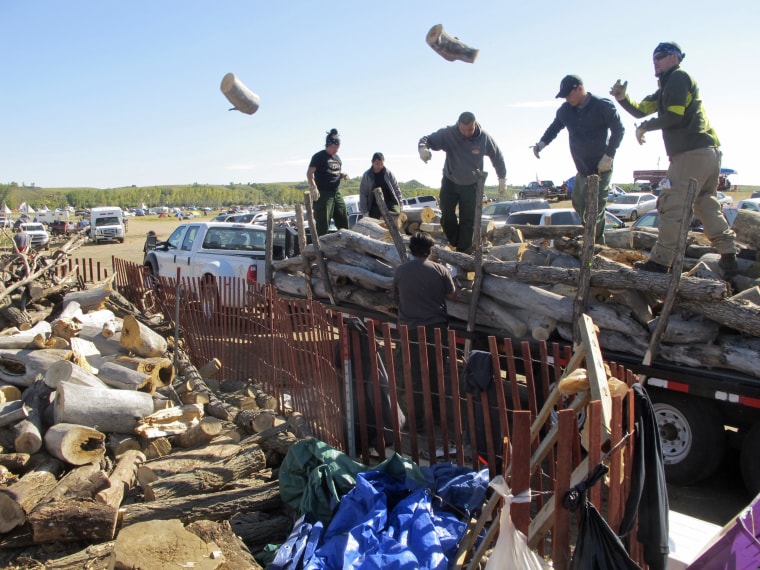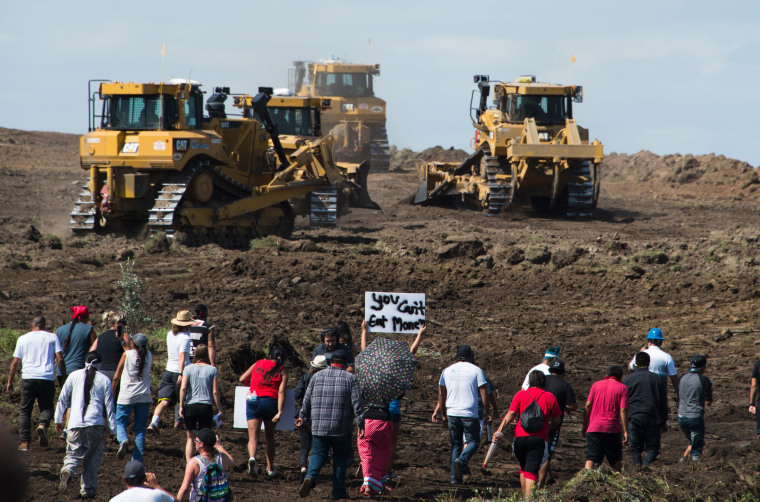The company behind the controversial Dakota Access Pipeline has purchased a large privately owned ranch adjacent to federal land that has been the site of daily protests by a Sioux tribe and others for weeks, public records show.
Energy Transfer Partners, the Dallas-based company financing the $3.7 billion pipeline that would transport 470,000 barrels of oil a day across four states from North Dakota to Illinois, this week purchased the roughly 9,000 acre Cannon Ball ranch, according to a deed filed with the Morton County Recorder's Office.
The price of the sale was not stated in the deed — which is not required by North Dakota law under what is known as an exemption code between both parties in a land deal — but the price is believed to be around $18 million, according to two people with knowledge of the deal.
In a statement to NBC News, a spokesperson for Energy Transfer Partners said the company had purchased land in North Dakota but refused to comment further.
Related: Standing Rock Sioux Takes Pipeline Fight to United Nations

Included in the deal are 429 acres of leased federal land that sit just adjacent to the site of the Oceti Sakowin Camp, where thousands have protested for weeks the construction of the pipeline that the tribe says would destroy ancient, sacred sites and permanently contaminate the reservation's main water supply.
The pipeline would come within a half-mile of the Standing Rock Sioux reservation, which straddles the North and South Dakota border. Under federal law, all private landowners whose property borders federally owned land are entitled to a permit to lease part of that land.
The sale is significant in the Standing Rock Sioux's standoff with Energy Access Partners because for weeks many protesters have occupied part of the ranch's leased federal land as more numbers have poured into the camp.
There are an estimated 3,000 to 4,000 in the camp, with several thousand more on weekends, according to Standing Rock Sioux Chairman Dave Archambault II. It is unclear what Energy Transfer Partners intends to do with the property.
The sale, the tribe said, does not change the status of the ongoing litigation between the tribe and the U.S. Corps of Engineers in federal court. The protests forced a halt in construction last month after the tribe sued the U.S. Army Corps of Engineers, which has jurisdiction over the land, arguing that it did not adequately consult with them before granting Energy Transfer Partners fast track approval in July. The Army Corps of Engineers said it did not oppose the suspension.
Related: Pipeline Company Says Contamination Worries 'Unfounded'
On Sept. 16, a federal appeals court ruled to officially halt the construction of the Dakota Access Pipeline that traverses Sioux land to give the court more time as it assessed concerns that the pipeline could destroy sacred sites and burial grounds.

The ruling came a week after a federal judge denied the tribe's request for a temporary injunction, a ruling which was followed hours later by the federal government announcing they would not allow work to resume on federal land until previous environmental decisions could be reviewed.
Archambault told NBC News that the tribe had in the past few weeks approached the ranch's owner looking to purchase the estate to preserve the tribe's historic sites that he says are on the property.
The land, Archambault said, has further significance now because of the presence of over 300 federally recognized Native American tribes who have joined the thousands of protesters at Cannon Ball to show their solidarity for the tribe's fight to stop the pipeline.
"It has become a lasting place to visit for all Americans," Archambault told NBC News. "[We wanted] to have an ongoing gathering place for Indigenous Peoples."
On Thursday, the tribe took its fight to Capitol Hill, where members urged House Democrats to reconsider the pipeline. Representative Raúl Grijalva (D-Arizona), the ranking Democrat on the House of Representatives Natural Resources Committee, called on the U.S. Army Corp of Engineers "to withdraw the existing permits for Dakota Access pipeline."
Grijalva said the pipeline threatened the tribe's natural resources and said the project was part of a "long history of pushing the impacts of pollution onto the most economically and politically disadvantaged people and communities across this country."
